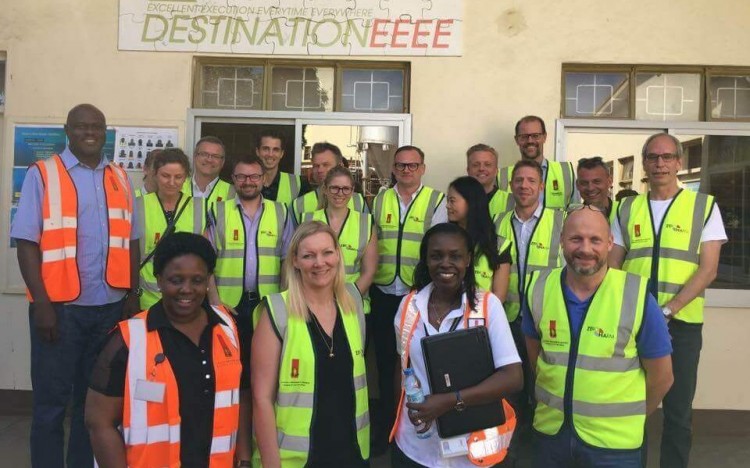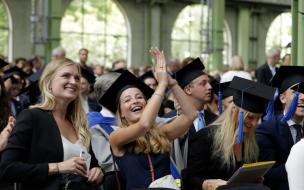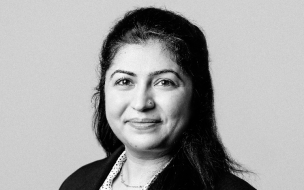After seeing the hardships faced by fellow business school students on a class trip to Uganda, a group of GEMBA students from Copenhagen Business School decided to do something about it
Peter Schou was sitting in a restaurant in Kampala, Uganda with his Global Executive MBA (GEMBA) colleagues from (CBS) in December 2018.They were in Uganda for an international module where they collaborate with MBA students from Makerere University Business School (MUBS).
The MUBS MBA students that Peter and his peers interacted with had a lasting impact on them. Two students in particular.
One woman had been in a car crash and lost both her legs. She still worked part-time in a local bakery while studying, only able to manage with the support of family and friends.
Another lived in a remote village 18 hours outside Kampala. She had to take the bus to the city every Thursday, study Friday, Saturday, and Sunday, and then travel 18 hours back to her home.
As a group, they questioned how they could complain about having to travel 30 minutes to class, when these women, with no means and spending each month just trying to pay for their education, showed unrelenting drive.
“We were inspired by them,” Peter says. “We were sitting at dinner and a couple of us asked, ‘Why don’t we see what it would take for us to help them out?’”
Peter led a fundraising initiative and, between them, the GEMBA class managed to raise money to fund the two women for the remainder of their course.
A new perspective on entrepreneurship
Peter (pictured below, right) admits that his class was a bit skeptical before the Kampala trip. Nobody from the class had been there before, and they questioned if this was the best place to learn about entrepreneurship and innovation.

When they arrived In Uganda, they soon saw that entrepreneurship there is a matter of life or death. A lot of people have no choice but to start their own business to earn a living.
“It was an eye-opener for us,” explains Peter, “it was valuable to see the entrepreneurship part of it all, how people did whatever they could to survive.
“In Denmark, people say if we don’t have a job, we can always live on welfare rather than the mindset that we have to do something. [In Kampala], it doesn’t matter what it is, they find something in their work to support their families. It’s more about the mindset of the people.”
Changing students’ lives
Associate professors at Copenhagen Business School, Thilde Langevang and Soren Jeppesen, have built a relationship with MUBS since working on a research project in Uganda almost a decade ago.
Since then, students pushed for an experiential study trip where they got to practice what they learned at business school on the ground. Hence the Kampala trip became an annual event.

During the trip, students from CBS visit local companies, share classes with MBA students from MUBS and collaborate with them on group work. It’s incredibly valuable, says Peter, to learn about their reasons for studying an MBA, and how they often struggle through hardship to do so.
As well as funding the two women from MUBS, the trip inspired Peter to donate to Street Business School he visited in the area. It’s an organization that funded and trained underprivileged women in business to help them start their own businesses.
The equipment on which they delivered presentations was outdated and worn, so Peter arranged for them to receive a number of new, high quality projectors.
Rebecca Namatovu, program manager at MUBS, says that the fundraising initiative has changed the lives of two of her students. There have been previous years in which students have paid the tuition for a single mother doing her MBA.
When Rebecca first communicated with the two women who the class helped last year, they told her that if the information wasn’t coming from her they’d have thought it was a joke.
Rebecca explains that the woman with the 18-hour commute no longer misses classes as often as she used to, she’s excelling, as she no longer must look for alternative ways to raise money to survive.
“These two ladies have become my friends, and they always email when they pass exams and do well,” she says.
The importance of international MBA study trips
Rebecca says that the shared classes with CBS students are always oversubscribed. Her students love the opportunity to speak with foreign MBAs and even miss lunch sometimes just to have more time with them.
They also revel in the company visits, something Rebecca explains is a rare opportunity for MBAs at MUBS.

Has she seen a change in her students?
Definitely. They’re more proactive, curious. They often pick up on theories and examples given to them by the CBS GEMBA students and probe their teachers to delve deeper into certain topics.
“I can’t stress the importance enough, it’s such a wonderful thing. I have seen our students change the way they look at things,” she says.
In Uganda, post-MBA students often stay in the jobs they were in before. They don’t study to move on. But after the visit from Copenhagen Business School, they begin to challenge this.
“I feel with these exchanges we are creating more globally aware students,” concludes Rebecca.
Images are either interviewee's own or taken from Copenhagen Business School Facebook
Student Reviews
Copenhagen Business School (CBS)
CBS: efficient international network
CBS has always been ranked among the best universities in Europe and this means that it has become a sign of professionalism and success.
The academic level is great thanks to the good teachers and the atmosphere is proactive and challenging. Lots of events are planned every week and this helps you to find your own way.
CBS is not only a business school, it is a great and efficient international network.
Good academic career
I did my Bachelors at CBS and their academic excellence and career opportunities led me to pursue my Masters in Accounting, Strategy and Control. I was very lucky to go on an exchange in Singapore for one semester it boosted me to get a career in a global firm. I like that it is super modern and has all the facilities for the business student in 2019. Especially, I liked the library and Bitlab where I spent most of my time studying. However, note that it is very demanding and studying here is no joke. Everything is very competitive and you are among the most excellent business students in the country. The interaction with international students helped me to see different perspectives in business and culturally and I was lucky to make friends from any part of the world. CBS is like a brand in Denmark. Every serious business company prioritizes us over any other Danish university and also it is free for European citizens. Overall, I have a very satisfying experience at CBS and I'm looking to continue my academical career even further.
CBS is one of the best!
All I have to say regarding my experience at CBS is that it is AMAZING. Having been tutored by world-class academic staff, I can definitely support that I am receiving the best of quality regarding my studies in Digital Marketing. Staff is very friendly and easy to approach. In addition, the facilities we enjoy are top class and meet any demands. Keep in mind that, EU citizens do not pay any fees. Student life might be non-existent here, but the location of the University in The very center of Copenhagen has a huge variety of choices to offer to students regarding their entertainment. Accommodation might be a problem, but early research of the market can be very useful. In addition, the University promotes diversity. In CBS University you can meet people from the whole world which is quite interesting. I definitely suggest CBS for any student who he's interested in pursuing a career in marketing or business.
The ideal business school
I have been enrolled in this university for 2 semesters. What I took from this experience is that there is nothing better out there for those looking for professional growth while being guided by some of the top-notch professors in Scandinavia. They have a really strong focus in technology and digital transformation and they are up to date to guarantee you land a job in the modern fast-evolving world. They also embrace diversity which means many students come from any part of the world and it takes the entire learning experience to another level. You simply learn from every other student cause everyone has different experiences and background which makes you open your mind and see the world from a different angle. In Denmark, even businesses prioritize people who graduate from CBS as it's commonly perceived as the most prestigious university for business graduates.
A Place of Personal Growth
In CBS you can expect an environment of proactive thinking and growth.
The university staff is always open to help and to debate. The teaching methods balance theoretical knowledge and practical skills enabling the student with capacity and confidence to enter the job market successfully. The existence of students from all over the world stimulates discussion and promotion of different cultures, ideas and perspectives. I highly recommend this university for students in business-related areas.
Environment
The environment here is really great. Despite the well organized buildings and libraries, there are also places for students to just stay and relax also even study in the corners of each campus. The professors are mostly really nice and try to interact with students a lot. So, to sum up, the environment is really nice for studying here.
Quality education
Quality education where it emphazises the importance of academic. No finger to put on this aspect of the school.
However, sometimes the administration and IT can be lacking a bit, but in general a really good choice for education!
Best Time!
Classes are challenging and conducted in a professional manner. CBS offers a wide range of possibilities to develop outside of the classes! Libraries and other facilities on the campus are very well adjusted to the student needs.
A heavily theory-based curriculum combined with an ever-stimulating environment
I am currently a Master student at CBS, but I have also completed a Bachelor's Degree in this university. I am quite satisfied with my studies and the teaching level. However, when compared to other business schools, it becomes apparent that most courses at CBS strive to find a good balance between theoretical insight and real-life examples. Compared to my exchange university, the projects that I have found myself writing at CBS have a far less practical application and also leave little room for creativity. If the teaching is heavily theoretical, on the bright side, the university arranges a number of events throughout the year to encourage students to apply their knowledge, in the form of career fairs, case competitions, and other events organized by student associations. In my experience, teachers are very easily approachable and happy to answer your questions. A foreign student like me will find a more international environment at Master level, since the number of international (or at least non-Scandinavian) students enrolled in the Bachelor programs is quite low. However, all communication (both oral and written) from teachers and the university offices is always in English. Administrative offices, student guidance services, the career center, and the international office are definitely worth a mention. All of the requests that I have had throughout the years have always been met with kindness, promptness and efficiency.
CBS: efficient international network
CBS has always been ranked among the best universities in Europe and this means that it has become a sign of professionalism and success.
The academic level is great thanks to the good teachers and the atmosphere is proactive and challenging. Lots of events are planned every week and this helps you to find your own way.
CBS is not only a business school, it is a great and efficient international network.
Good academic career
I did my Bachelors at CBS and their academic excellence and career opportunities led me to pursue my Masters in Accounting, Strategy and Control. I was very lucky to go on an exchange in Singapore for one semester it boosted me to get a career in a global firm. I like that it is super modern and has all the facilities for the business student in 2019. Especially, I liked the library and Bitlab where I spent most of my time studying. However, note that it is very demanding and studying here is no joke. Everything is very competitive and you are among the most excellent business students in the country. The interaction with international students helped me to see different perspectives in business and culturally and I was lucky to make friends from any part of the world. CBS is like a brand in Denmark. Every serious business company prioritizes us over any other Danish university and also it is free for European citizens. Overall, I have a very satisfying experience at CBS and I'm looking to continue my academical career even further.
CBS is one of the best!
All I have to say regarding my experience at CBS is that it is AMAZING. Having been tutored by world-class academic staff, I can definitely support that I am receiving the best of quality regarding my studies in Digital Marketing. Staff is very friendly and easy to approach. In addition, the facilities we enjoy are top class and meet any demands. Keep in mind that, EU citizens do not pay any fees. Student life might be non-existent here, but the location of the University in The very center of Copenhagen has a huge variety of choices to offer to students regarding their entertainment. Accommodation might be a problem, but early research of the market can be very useful. In addition, the University promotes diversity. In CBS University you can meet people from the whole world which is quite interesting. I definitely suggest CBS for any student who he's interested in pursuing a career in marketing or business.
The ideal business school
I have been enrolled in this university for 2 semesters. What I took from this experience is that there is nothing better out there for those looking for professional growth while being guided by some of the top-notch professors in Scandinavia. They have a really strong focus in technology and digital transformation and they are up to date to guarantee you land a job in the modern fast-evolving world. They also embrace diversity which means many students come from any part of the world and it takes the entire learning experience to another level. You simply learn from every other student cause everyone has different experiences and background which makes you open your mind and see the world from a different angle. In Denmark, even businesses prioritize people who graduate from CBS as it's commonly perceived as the most prestigious university for business graduates.
A Place of Personal Growth
In CBS you can expect an environment of proactive thinking and growth.
The university staff is always open to help and to debate. The teaching methods balance theoretical knowledge and practical skills enabling the student with capacity and confidence to enter the job market successfully. The existence of students from all over the world stimulates discussion and promotion of different cultures, ideas and perspectives. I highly recommend this university for students in business-related areas.
Environment
The environment here is really great. Despite the well organized buildings and libraries, there are also places for students to just stay and relax also even study in the corners of each campus. The professors are mostly really nice and try to interact with students a lot. So, to sum up, the environment is really nice for studying here.
Quality education
Quality education where it emphazises the importance of academic. No finger to put on this aspect of the school.
However, sometimes the administration and IT can be lacking a bit, but in general a really good choice for education!
Best Time!
Classes are challenging and conducted in a professional manner. CBS offers a wide range of possibilities to develop outside of the classes! Libraries and other facilities on the campus are very well adjusted to the student needs.
A heavily theory-based curriculum combined with an ever-stimulating environment
I am currently a Master student at CBS, but I have also completed a Bachelor's Degree in this university. I am quite satisfied with my studies and the teaching level. However, when compared to other business schools, it becomes apparent that most courses at CBS strive to find a good balance between theoretical insight and real-life examples. Compared to my exchange university, the projects that I have found myself writing at CBS have a far less practical application and also leave little room for creativity. If the teaching is heavily theoretical, on the bright side, the university arranges a number of events throughout the year to encourage students to apply their knowledge, in the form of career fairs, case competitions, and other events organized by student associations. In my experience, teachers are very easily approachable and happy to answer your questions. A foreign student like me will find a more international environment at Master level, since the number of international (or at least non-Scandinavian) students enrolled in the Bachelor programs is quite low. However, all communication (both oral and written) from teachers and the university offices is always in English. Administrative offices, student guidance services, the career center, and the international office are definitely worth a mention. All of the requests that I have had throughout the years have always been met with kindness, promptness and efficiency.
Monthly checkups, good acedmic tutoring
Copenhagen business school impresses me every single time I think about the school as a whole. What’s particularly impressive is how they always check in to ensure everyone is on the same page. Whether it's through small group discussions or one-on-one feedback sessions, the professors really take the time to make sure no one is left behind. They’re always available for follow-up questions and give tailored feedback that helps students understand where they can improve and how to apply what they’ve learned to real-world situations. It's clear that at CBS, the focus is on learning, not just getting paid. The professors are not just there to deliver lectures but are deeply invested in making sure every student is progressing.
The professors.. 👌🏾
The professors at Copenhagen Business School are genuinely excellent and play an essential role in developing students with extensive real-world experience. What stuck out to me was how supportive they are outside of lectures and class time. They are always willing to answer inquiries, whether concerning the course material or career advice, and many of them work beyond of usual hours to assist students.The instructors' accessibility fosters an environment in which you feel encouraged, not only intellectually, but also in terms of personal growth and future career goals. It's apparent that they care significantly about helping students achieve.
Jpp prospects with top companies
Copenhagen Business School offers a unique blend of academic rigor and practical experience, making it an excellent choice for aspiring professionals, especially in fields like investment banking and consulting. With strong ties to top-tier companies, the job prospects are promising, bolstered by a robust network of alumni and industry connections. The Danish government provides financial support (SU) for local and EU students, alleviating the financial burden and allowing for a focus on academics and career-building activities. The curriculum is well-structured, offering ample free time for part-time jobs, student clubs, or pursuing personal interests. The balance between studies and extracurriculars nurtures a dynamic student experience, while the international environment fosters a global perspective. CBS equips students with not just a degree but a solid foundation in real-world business practices, making graduates highly competitive in the job market.











